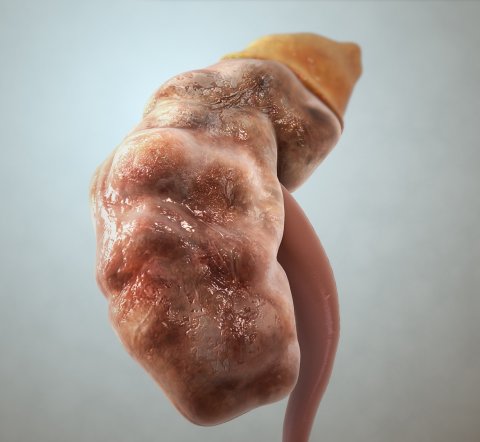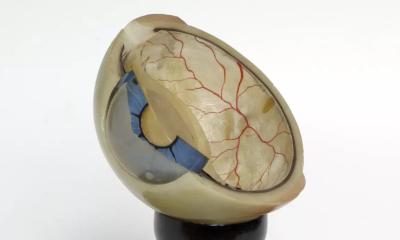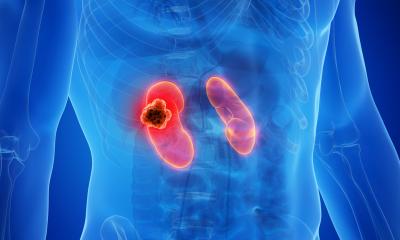News • Nephritis as a marker
Kidney an early warning sign for severe COVID-19 cases
A course of action to early detect and treat severe courses of COVID-19 infections has been developed by an expert-team of the University Medical Center Goettingen (UMG).

Image source: Scientific Animations Inc. (CC BY-SA 4.0)
A simple urine test is intended to help medical professionals to recognize warning signs of future decompensation of COVID-19 infections earlier. With the help of a few parameters, the treatment of imminent complications can possibly start days before the lungs and other organs fail. Hopefully, this could prevent life-threatening deteriorations in some patients, so that they no longer need to be transferred to the ICU or lose their life. The findings of the UMG-scientists have been published as Correspondence in the journal The Lancet.
If and to which extent the findings of the UMG can improve patient care, is currently evaluated in a large, non-interventional observational study with the title “COVID-19 Associated Nephritis as Early Predictor for Complicated Course of Disease”. The study in cooperation with several University hospitals in Germany just has started on April, 24th 2020.
When it came to inpatient treatment of COVID-19 infections, the UMG medical team had noticed that in those, who became the sickest a few days later, - in addition to the lungs and heart - the kidneys were affected at an early stage. The findings of the UMG were then evaluated by experts from the University Medical Center Hamburg-Eppendorf and other University hospitals and discussed with close friends and experts from other countries such as Italy, China, England and the USA. Current tissue examinations of the deceased support the assumption that due to the dramatic disease of the other organs, early kidney involvement has so far been neglected.

If urine parameters are suspicious for COVID-19 associated nephritis, the UMG's path of action is followed by the determination of only 3 other simple parameters: albumin in the blood, albumin in the urine and antithrombin III. Together with the urine test, these 3 parameters serve to diagnose the "capillary leak syndrome": a life-threatening loss of blood components and protein from the blood into the (lung) tissue through a general capillary leak caused by the virus. These three parameters are used to predict the individual risk of the patient for severe course of COVID-19 disease and complications. „If only one of the three parameters is severely altered, then the patient has a high risk of worsening on the normal ward and to require transfer to the ICU because of organ failure“, explains the corresponding author of the publication, Prof. Oliver Gross, Clinic for Nephrology and Rheumatology at the UMG.
The course of action of the UMG for early detection of the capillary leak syndrome in patients with COVID-19 sensitives health-care workers to focus their work on critical parameters: Serious lack of albumin in the blood results in an interstitial pulmonary edema (water lung), because the capillary leak leads to the loss of albumin from the blood into the lung tissue. As a result, the lung tissue swells (the protein in the tissue leads to water retention), breathing and the exchange of oxygen become more difficult. The water retention is treated with diuretics. By focusing their work on the early detection of severe lack of albumin, healthcare workers know what to watch for:
- diuretic therapy can start before breathing deterioriates;
- diuretics work much worse in the absence of albumin. Therefore, significantly higher doses of loop diuretics are used for dewatering. Or dialysis machines may have to be used earlier for water removal before the lung tissue is full of water;
- critical drugs such as antibiotics can have an unexpectedly different concentration of active substances due to the changed plasma protein binding. Therefore, the drug levels should be determined preventively,
- the lack of protein in the blood can easily lead to circulatory failure. Preventive measures can be taken at an early stage.
Serious lack of antithrombin III can result in thrombosis (clots in the blood vessels) and thromboembolism (clots loosen and clog the pulmonary vessels). Blood thinners such as heparin are used preventively to prevent thrombosis and thromboembolism. Due to the early detection of severe antithrombin deficiency in the blood, the healthcare workers also knows what to look out for:
- preventive therapy with blood thinners can start before blood clots form;
- the most common blood thinner heparin does not work properly because heparin works via the antithrombin. Therefore, significantly higher doses of heparin are usually required to achieve the desired preventive effect and thus prevent blood clots.

„If the findings of our UMG expert team can be confirmed, this would have a long lasting effect. This would make it possible to predict the need for an upcoming stay in the intensive care unit in the future”, says the seniorauthor of the publication, Prof. Dr. Simone Scheithauer, director of the Institute of Infection Control and Infectious Diseases at the UMG. “In addition, patients could be assigned earlier and more appropriately for special therapies (also in drug studies). By early detection of the capillary leak syndrome, preventive therapies could be initiated, and, in some cases, life-threatening courses of disease could be prevented,” states Prof. Scheithauer.
The course of action of the UMG starts with a simple urine test. According to the authors, the procedure is also suitable for COVID-19 patient groups in nursing homes and for those affected, who are initially treated at home on an outpatient basis after a diagnosis has been made. Here, the urine test could serve as an early warning sign of an imminent deterioration of the condition. This could lead to an earlier intervention by the family doctor, which could prevent further harm and even hospitalization.
Source: University Medical Center Goettingen (UMG)
07.05.2020







